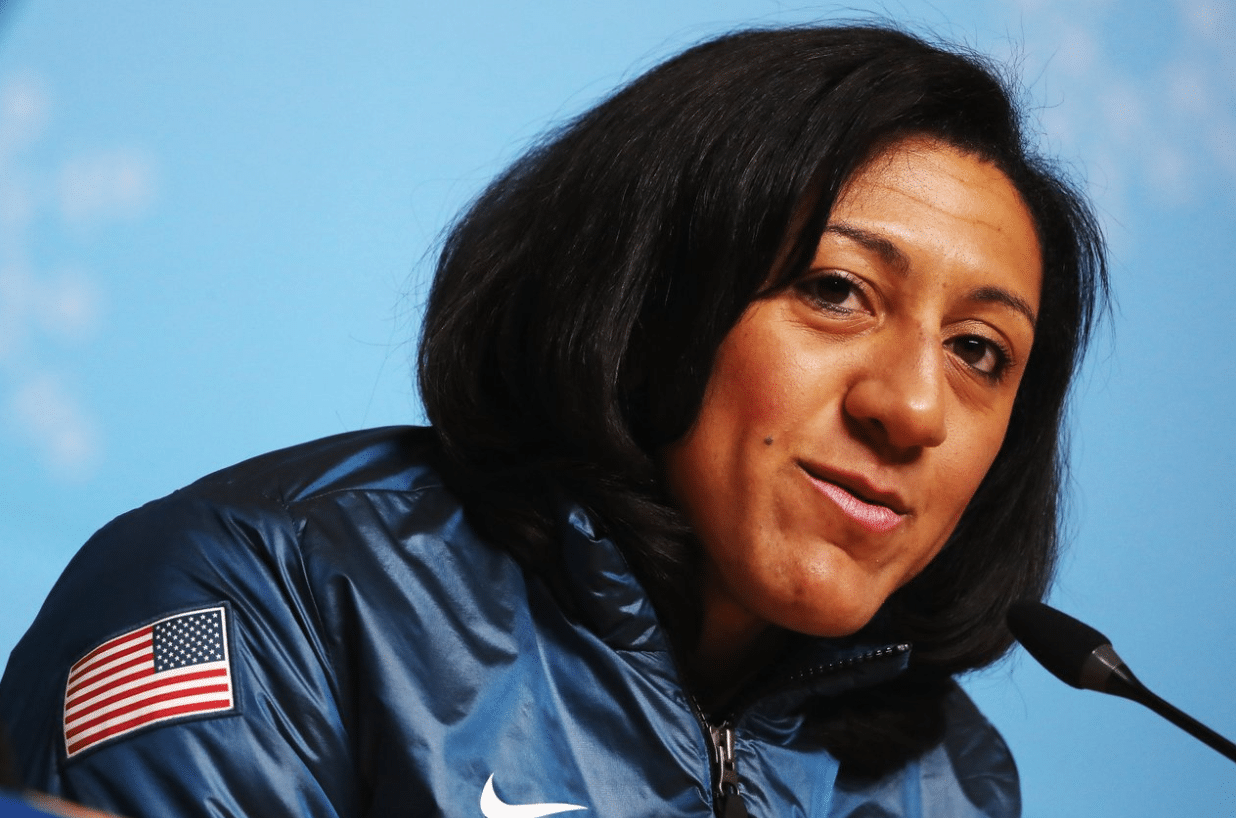“You should expect a lot out of me,” says Chloe Kim, the youngest gold medalist in snowboarding history. “I’m gonna go off.”
Like the female athletes in this year’s Winter Games, many women in business have the natural drive to push themselves toward greatness in their careers. But unfortunately, they often feel pressured to put their ambition aside for caretaking responsibilities.
And although we’ve seen some improvement in this area, progress is never linear. According to a recent Qualtrics report, in 2021, 71% of women intended to stay on with their employer. In 2022, this figure has dropped to 63%. Further, women only hold 4% of leadership roles at Fortune 500 companies.
Image source: via GIPHY
Professional female athletes face many of the same roadblocks that women in business have. Yes, women represent more than 45% of the athletes in Beijing this year—a record for the Winter Games. But female athletes are still largely overworked and underrepresented. And they’re ready to do something about it.
If you’re looking for some inspiration as a business professional, take a note from these world-class 2022 Winter Games athletes.
Take care of your mental health
Organizations are starting to realize that mental health support isn’t just a nice-to-have benefit—it has a clear ROI. According to benefits group Unum, employees who feel less stress and anxiety are more likely to stay at a company and are often more focused and productive.
In the workplace, female leaders’ mental health has taken a hit, thanks to COVID-19. Qualtrics data shows that they’re the most likely to resign from their positions due to added pressure. Mothers and Black women are also especially at risk, as the pandemic has had a disproportionate “burnout” effect on these groups.
Winter Games athletes—alpine skier Mikaela Shiffrin and snowboarder Chloe Kim—understand these mental health struggles well. Shiffrin was devastated following her father’s death in 2020.

Image source: Firstpost
“It takes all of your physical and mental and emotional energy in the beginning just to wake up and get out of bed,” Shiffrin told The Washington Post. To many’s surprise, the four-time world champion fell victim to pressure as she missed a gate in the slalom leaving her disqualified from the event on Wednesday.
Both Shiffrin and Kim have learned through experience that to perform well, their mental health needs to take first priority. Kim recently told Time magazine, “I’ve been more open about speaking on the topic of mental health … because I really felt that affect me. I was struggling with my mental health, and I finally decided that I needed some help.”

Image source: CBS Sports
However, pushing employee mental health to the top of the priority list will require structural and budget shifts for most businesses. Managers need to create a culture where vulnerability is not only accepted but encouraged.
They need to model mentally healthy behaviors—like making sure to take time for self-care and mindfulness—and facilitate a connection among employees. Regular check-ins with direct reports are a great way to start to shift company attitudes toward prioritizing mental health.
Use your position to speak out about important topics
In a time of global and political unrest, it can be difficult to speak your truth—particularly in a workplace setting. However, it’s always appropriate to stand up for what’s right and, as a professional, speak up for those who aren’t able to.
Beyond being appropriate, this openness is good for the workplace. If employees feel comfortable sharing their opinions, they’re likely to trust leadership—and that confidence translates to productivity. Neuroeconomist Paul J. Zak found that high-trust companies saw 76% more employee engagement than low-trust companies.
Feeling unsure about being open at work? Look to cross-country skier Jessie Diggins for inspiration.

Image source: NPR
Last season, Diggins became the first American to take home both the Tour de Ski and overall World Cup titles. She understands that she has an elevated platform—and she uses it. She’s also outspoken about issues that she holds close to her heart—like disordered eating and climate change.
Set yourself up to use your voice by thinking about when you may want to speak up. The Harvard Business Review suggests creating an “if-then” plan: “if I see this, then I’ll do that.” You identify situations in which you would need to speak up and then come up with strategic responses.
Choose your family and your career (or don’t—it’s up to you)
During the pandemic, many female professionals have been forced to juggle their careers with familial duties. They’re struggling with burnout, shifting expectations, and demands from both work and home.
On the flip side, men with families rarely have to choose one or the other. In a recent YouTube video, actress/model/singer Priyanka Chopra-Jonas explains this phenomenon to a male audience member: “You get the ability to get the job, to be the CEO, and nobody questions when you’re driven, at 50, and have three children, how you’re managing it all.”

Image source: NBC News
Women in business shouldn’t have to choose between their family and their career. You can be both a parent and a business professional—or top athlete in the world—without constantly explaining how you “do it all.”
The Winter Games’ bobsledder Elana Meyers Taylor doesn’t let the naysayers bring her down. She’s tied for most-decorated female athlete in Winter Games history, and she’s married to a fellow bobsledder, Nic Taylor. They had a son, Nico, in February of 2020.
“It’s been quite an adventure the whole time. Figuring out how to train, how to breastfeed, how to do all these different things, how to travel around the world.”
The closer society gets to gender parity and real equality, the less frequently women will have to answer these stereotypical questions. Stanford-based family researchers Carolyn and Phil Cowan have coined a term that they believe explains this type of societal inequality: “unentitlement.”
A majority of women don’t feel entitled to put their own needs or ambitions ahead of their male partners’, and—perhaps subconsciously—feel the need to do most of the caregiving work solely on the basis of sex.
Clinical psychologist Darcy Lockman has found that couples who distribute the workload evenly have actively decided together that if one or the other feels overwhelmed, they sit down and recalibrate. Their ultimate goal is to be equal partners in the relationship. More women in business—or women, in general—should insist on this type of equality.
Balance: It’s not just for beams anymore
The 2020 Summer Games in Tokyo were credited as “the first gender-equal Games,” with women representing 48.7% of competitors. But equality isn’t the same as equity. Even with an “equal” number of female and male athletes, systemic sexism still persists in professional sports.
The same is true in the business world. And while we can’t eliminate sexism overnight, we can keep working toward gender equality—with the Winter Games’ female athletes as our inspiration.
Many of these women are balancing more than just their athletic performance on their shoulders—they’re caregivers too. We can relate to them there. Here at RingCentral, we’re in awe of their ability to show up and be their very best. Or, as Chloe Kim would put it, “go off.”
Originally published Feb 09, 2022, updated Dec 30, 2022





